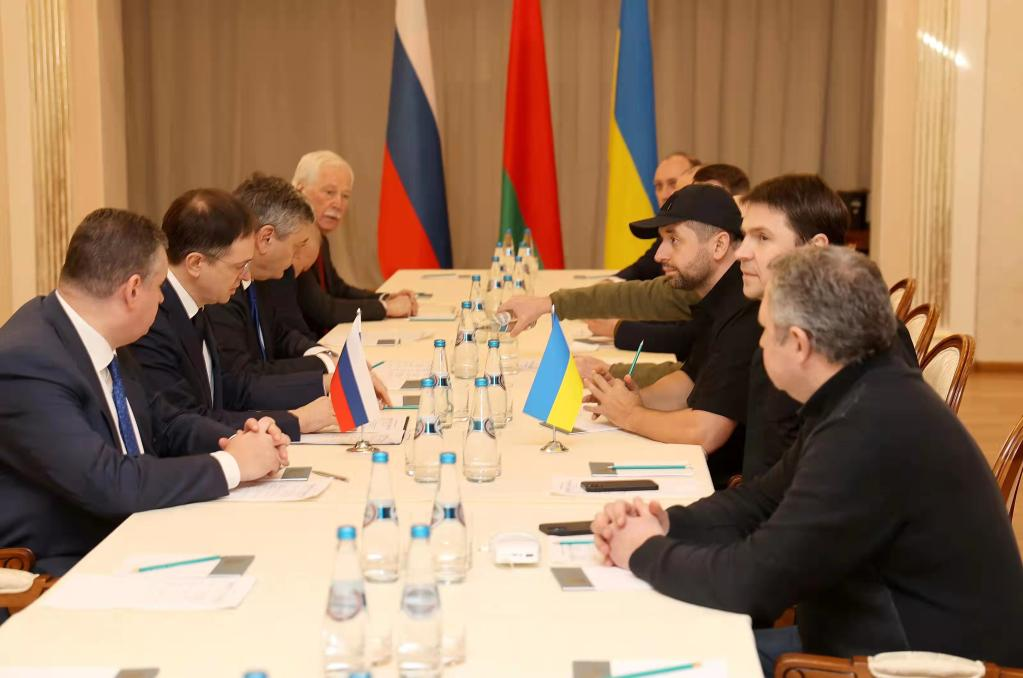
Photo shows a view of the talks between the Ukrainian and Russian delegations held in the Gomel region in Belarus on Feb. 28, 2022. (Belta news agency via Xinhua)
by Xinhua writer Yuan Xinfang
MOSCOW, March 1 (Xinhua) -- Russia and Ukraine concluded on Monday their first round of negotiations in Belarus with no clear breakthrough.
The talks are certainly a positive signal, observed analysts, but the negotiation process would be rather complicated.
NO BREAKTHROUGH
The long-awaited negotiations between delegations from Russia and Ukraine was held in the Gomel region in Belarus and lasted for five hours.
Headed by presidential aide Vladimir Medinsky, Moscow's delegation was formed by representatives from the defense and foreign ministries, among others.
Ukrainian Defense Minister Olexiy Reznikov and the deputy head of the ministry of foreign affairs were among the participants from the Ukrainian side.
Before the negotiations, representatives from the Russian side said a key aim would be to achieve peace.
Belarusian Foreign Minister Vladimir Makei welcomed the participants and assured safety during the negotiation process.
After the consultations, Medinsky, head of the Russian delegation, said that the next round of peace talks would take place on the Belarusian-Polish border in the coming days.
Medinsky also said that each one of the delegations would now head back to their capitals to further discuss all negotiation positions to prepare for the next round of negotiations.
"We have found some issues on which we can predict there would be common positions," the official said, adding that all negotiation positions were discussed in detail during the talks.
HEIGHTENED TENSIONS
While the talks were going on, Russian President Vladimir Putin held a telephone call with French President Emmanuel Macron, reiterating that a settlement would only be possible if Russia's security concerns were taken into account.
Putin said it was important to recognize "Russia's sovereignty over Crimea," as well as the country's commitment to solving the tasks of Ukraine's "demilitarization" and "denazification", and the issue of Ukraine's neutral status.
As for developments of Russia's military operation, the country's armed forces have hit 1,114 Ukrainian military infrastructure objects, according to Russian Defense Ministry spokesman Igor Konashenkov.
Russian Defense Minister Sergei Shoigu informed Putin earlier on Monday that the country's nuclear deterrence forces have begun combat duty with reinforced staff.
Meanwhile, Moscow has taken more retaliatory measures in response to recent restrictions imposed by the West.
As a response to the ban of European states on Russian air carriers, a restriction has been introduced on the operation of flights by air carriers from 36 countries, according to aviation authorities.
The country's economy has also been impacted. Russia's Central Bank said Monday that "external conditions for the Russian economy have drastically changed," announcing the decision to increase the key rate to 20 percent per annum from Feb. 28.
COMPLICATED NEGOTIATION
The world is closely following developments with regards to the peace talks.
"The talks are certainly a positive signal," Bogdan Bezpalko, a member of the Council for Interethnic Relations under the President of the Russian Federation, said in an interview with Xinhua on Monday.
According to the expert, Russia has shown that it is ready to solve problems through diplomacy.
Alexander Gusev, director of Russia's Institute for Strategic Planning and Forecasting, considered the current negotiation process to be rather complicated.
"The situation that is currently developing in Ukraine is quite complicated, so it's simply impossible to set ambitious goals when it comes to the negotiation process," Gusev told Xinhua.
"On the other hand, the talks have shown that both sides are ready for dialogue, they have found common ground... and I am convinced that the negotiation process will continue, this is just the beginning," he said. ■



